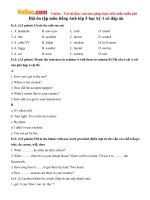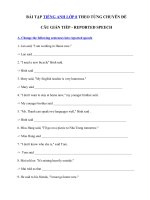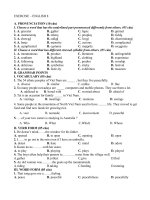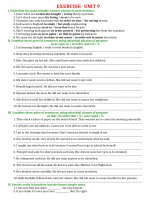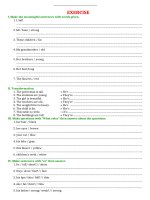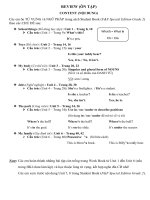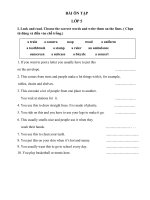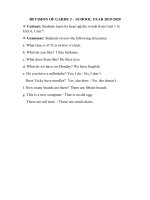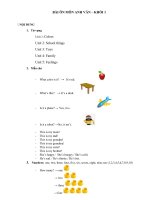Nội dung ghi bài - ôn tập môn Tiếng Anh 8
Bạn đang xem bản rút gọn của tài liệu. Xem và tải ngay bản đầy đủ của tài liệu tại đây (73.16 KB, 8 trang )
<span class='text_page_counter'>(1)</span><div class='page_container' data-page=1>
<b>EXERCISE- UNIT 9</b>
<b>I. Underline the most suitable word or phrase in each sentence.</b>
<b>1. Janet went out so that she bought / to buy Harry a present.</b>
<b>2. Let’s check once more for being / so as to be sure.</b>
<b>3. Scientists use only local materials in order to save / for saving money.</b>
<b>4. Jack went to England to study / for study engineering.</b>
<b>5. He’ s saving money so as to / so as that buy a bicycle.</b>
<b>6. She’s wearing dark glasses in order protect / for protecting her from the sunshine.</b>
<b>7. I’m buying paint so as to paint / so that to paint my hall door.</b>
<i><b>8. He tums out the light in order to not waste / in order not to waste electricity.</b></i>
<b>II. Combine these pairs of sentences, using adverbial phrases of purpose: </b>
<b>so as (not) to / in order (not) to + V1</b>
1. I’m learning English. I want to read books in English.
...
2. Nam does morning exercises regularly. He wants to keep fit.
...
3. Mrs. Hoa gave up her job. She could have more time with her children.
...
4. Mr. Tan saves money. He can buy a new house.
...
5. Loan gets a job. She wants to help her poor family.
...
6. My sister wears warm clothes. She did not want to get cold.
...
7. Ronald Ingo hurried. He did not want to be late.
...
8. Nguyen locked the door. He did not want to be disturbed.
...
9. She did not scold her children. She did not want to annoy her neighbors.
...
10. He turned out the lights. He did not want to waste electricity.
...
<b>III. Combine these pairs of sentences, using adverbial clauses of purpose: </b>
<b>so that /in order that + S + can/could + V1</b>
1. They stuck a piece of paper on the notice board. They wanted me to come the meeting punctually.
...
2. I will give you my address. I want you to be able to write to me.
...
3. I go to the evening class because I don’t want my friends to laugh at me.
...
4. Our teacher spoke very slowly. He wanted us to understand what he said.
...
5. I taught my sister how to ri de because I wanted her to go to school by herself.
...
6. This girl read only for short periods each day. She did not want her eyes to be strained.
...
7. He whispered with her. He did not want anyone to be disturbed.
...
8. The clown took off his mask. He did not want the children to be frightened.
...
9. Her brother drove carefully. He did not want to cause accidents.
...
10. Sally dutifully followed her parents’ advice. She did not want to cause trouble for her parents.
...
<b>IV. Put the verbs in brackets into the future simple tense.</b>
</div>
<span class='text_page_counter'>(2)</span><div class='page_container' data-page=2>
3. “I’m really hungry.” - “In that case, we (not/wait) ____________ for John.”
4. He hopes that he (win) ____________ the first prize.
5. Tom (not/pass) ____________ the examination. He hasn’t worked hard enough for it.
6. When you (get) ____________ back?
7. I (remember) ____________ this day all my life.
8. I (call) ____________ you when I arrive.
9. If I have a lot of money, I (buy) ____________ this motorbike for you.
10. David (be) ____________ at home this evening?
11.1 (call) ____________ you in a few minutes later.
12. If it rains, we (not/go) to the beach.
13.1 (come) ____________ to you immediately when you finish working.
14. A: “I’m driving to the party. Would you like a lift?”
B: “Ok, I (not/ take) ____________ the bus, I (come) ____________ with you.
15. If you lose the job, what you (do) ____________ ?
<b></b>
<b>------TEST 1</b>
<b>I. Choose the most suitable words or phrases to complete the sentences.</b>
1. I put the heater on ____________ the plants warm.
a. keep b. keeping c. to keep d. for keeping
2. ____________ is a long stick that someone put under their arm to help them walk when they have
hurt their leg.
a. Crutch b. Wheelchair c. Stretcher d. Bandage
3. Would you please ____________ me a sterile dressing?
a. to give b. give c. giving d. given
4. She was ____________ for days after the accident.
a. unconscious b. conscious c. consciously d. unconsciously
5. A: Shall I do the washing-up? - B: ____________ .
a. I’m afraid not b. I don’t think so
c. I’m sorry I can’t d. No, thanks. I can do it myself
6. Calm ____________ and tell me what happened.
a. out b. down c. in d. up
7. ____________ catch up with his study, he worked through the summer.
a. In order to b. In order that c. In order not to d. So that
8. She ____________ off a bike and ____________ her head on the road.
a. fell / had b. fell / hit c. fall / hit d. fall / had
9. It’s too cold outside. ____________ ? - Sure. I’ll do it right now.
a. Would you like to shut the window? b. Will you shut the window?
c. Shall I shut the window? d. Can I shut the window?
10. He didn’t ____________ to the station in time to catch the train.
a. get b. reach c. arrive d. make
<b>* Pick out the word whose stress pattern is not the same as that in the rest.</b>
11. a. damage b. revive c. promise d. bandage
12. a. asleep b. conscious c. sterile d. tissue
<b>II. Choose the words or phrases that need correcting.</b>
1. He is going to get to work earlier in order impress the boss.
A B C D ...
2. It’s a secret between us and I promise I don’t tell anybody.
A B C D ...
<b>III. Supply the correct tenses or forms of the verbs in brackets.</b>
1. She (join) ____________ in our trip next summer?
2. I (not/meet) ____________ her at school since last week.
3. Listen! Why the baby (cry) ____________ ?
</div>
<span class='text_page_counter'>(3)</span><div class='page_container' data-page=3>
8. What you (do) ____________ with the ladder, Ba?
- I (climb) ____________ up that tree to pick up some fruit.
<b>IV. Use the correct word form of the word given in each sentence.</b>
1. A boy fell off his bicycle and became ____________ . (CONSCIOUS)
2. ____________ , the victim was taken to the hospital. (IMMEDIATE)
3. We were very happy because of his quick ____________ . (REVIVE)
4. Nam feels a pain in his head. He is having a ____________ . (HEAD)
5. Talk to the victim so as to keep her ____________ . (WAKE)
6. Someone put ____________ on the wound and held it tight. (PRESS)
7. Don’t fall ____________ while driving your car. You may cause accidents. (SLEEP)
8. The mother looked ____________ about her son. (WORRY)
<b>V. Choose the correct answers to complete the passage.</b>
Man : Emergency Service.
Girl : Please send (1) ____________ to Quang Trung School. The address is 30 Quang Trung Street,
Dong Da District.
Man : Can you tell me what (2) ____________ ?
Girl : A motorbike crashed into a bicycle and a schoolgirl fell (3) ____________ her bike and was (4)
____________ .
Man : Did her head bleed?
Girl : No, I don’t think so.
Man : Try to keep her awake. Leave the patient (5) ____________ flat and keep her warm. The
ambulance will (6) ____________ there in about 10 minutes.
Girl : Thank you.
1. a. an address b. an ambulance c. a motorbike d. a doctor
2. a. happened b. appeared c. did d. made
3. a. on b. of c. off d. in
4. a. conscious b. awake c. unconscious d. asleep
5. a. standing b. leaving c. sitting d. lying
6. a. take b. send c. be d. stay
<b>VI. Read the passage carefully. Then decide whether each of the following statements is TRUE or </b>
<b>FALSE.</b>
Yesterday, on the way home from school, Hung saw an accident. A boy was run over by a taxi when he
was riding. The boy’s leg was broken and it was bleeding badly. Someone there tried to stop the bleeding.
They put pressure on it and held it tight. A woman covered the wound by her handkerchief. A man used
his mobile phone to call the emergency service. A few minutes later, an ambulance arrived and sent the
boy to hospital. A policeman came to see the scene immediately. Some witnesses told the police that the
taxi driver was driving at a high speed when the accident happened. Some others began talking about the
traffic accidents in these days and blamed the increasing number of accidents on the roads for careless
driving.
<b>True or False?</b>
1. Hung saw a crash yesterday. ...
2. The boy was sent to hospital by a passenger. ...
3. The boy’s leg was hurt. ...
4. The driver was driving very carelessly when the accident happened. ...
<b>Questions:</b>
5. The boy’s ____________ was bleeding after the accident.
a. head b. leg c. hand d. shoulder
6. Someone tried to stop the bleeding by using a ____________ to cover the wound.
a. pressure b. handkerchief c. cloth d. dressing
<b>VII. Rewrite the following sentence so that it has the similar meaning to the first.</b>
1. Jack cools his bum immediately. He wants to minimize tissue damage. (in order to)
...
2. Nam last came back to his village five months ago.
Nam has ...
3. She walked very slowly. She didn’t fall down. (so as not to)
</div>
<span class='text_page_counter'>(4)</span><div class='page_container' data-page=4>
The girl asked ...
5. He doesn’t type as fast as he used to.
He used ...
<b>VIII. Rearrange words to make full sentences.</b>
1. the victim / or she / give / a cup of tea / when he / revives /.
...
2. the burned area / cover / a thick sterile / with / dressing /.
...
3. below the level of / the victim’s head / the heart / should be /.
...
4. will / you / contact / how / your friend?
...
5. for the flowers / me / in the hospital / very much / thank you / you / sent /.
...
<b></b>
<b>------TEST 2</b>
<b>I. Choose the most suitable words or phrases to complete the sentences.</b>
1. Please give me a ____________ . He gets a bad cut in his leg.
a. blanket b. wheelchair c. chart d. scissors
2. He is working very hard ____________ get poor grades.
a. in order to b. to c. in order not to d. as not to
3. ____________ quiet? I’m trying to learn.
a. Are you please be b. Are you please being c. Has you please been d. Will you please be
4. She covered her knees ____________ a blanket.
a. in b. with c. under d. of
5. Leave the victim ____________ flat and don’t let him ____________ chilled.
a. lying / to become b. to lie / become c. lying / become d. to lie / to become
6. They moved to the city ____________ well-paying jobs.
a. in order to get b. for getting c. in order not to get d. so that getting
7. I try to cheer him ____________ , but he just kept staring out the window.
a. on b. up c. off d. out
8. Don’t ____________ the victim with blankets or coats
a. overcome b. overheat c. overhear d. overcook
9. People use first- aid in order to ____________ the victims pain and anxiety.
a. cure b. treat c. increase d. ease
10. We don’t know the name of the injured person.
a. sterile b. burned c. wounded d. unconscious
<b>* Choose the word whose underlined part is pronounced differently from that of the others.</b>
11. a. ambulance b. bandage c. damage d. patient
12. a. hit b. tight c. injection d. sting
<b>II. Choose the words or phrases that need correcting.</b>
1. You don’t have to keep medicines where children can get them.
A B C D ...
2. The room got quietly when the professor came.
A B C D ...
<b>III. Supply the correct tenses or forms of the verbs in brackets.</b>
1. Loan (get) ____________ up early yesterday morning to review her lessons.
2. I’m sure he (come) ____________ back soon.
3. How long you (learn) ____________ English?
4. I need (study) ____________ tonight.
5. I enjoy (cook) ____________ fancy meals.
6. Peter (just/see) ____________ his old friend in the Street.
7. He (always /lose) ____________ his keys.
8. The train (leave) ____________ Plymouths at 11.30 tomorrow.
<b>IV. Use the correct word form of the word given in each sentence.</b>
</div>
<span class='text_page_counter'>(5)</span><div class='page_container' data-page=5>
2. People use first-aid to ease the victims pain and ____________ . (ANXIOUS)
3. Relax for a few minutes and you’ll feel more ____________ . (COMFORT)
4. The lecturer is giving us first-aid ____________ . (INSTRUCT)
5. The injured player was carried out of the football ground on a ____________ . (STRETCH)
6. The woman did not regain ____________ and died the next day. (CONSCIOUS)
7. Doctors have succeeded in finding a better ____________ for the disease. (TREAT)
8. A dog has bitten him. He needs an anti-tetanus ____________ . (INJECT)
<b>V. Choose the correct answers to complete the passage.</b>
There are some first-aid instructions for (1) ____________ .
- Leave the patient (2) ____________ flat.
- Don’t (3) ____________ him / her to sit or stand.
- (4) ____________ the patient’s feet, or (5) ____________ his / her head below the level of the (6)
____________.
- Don’t let the victim get (7) ____________ .
- Give the victim a cup of (8) ____________ when he / she revives.
1. a. fainting b. shock c. bum d. headache
2. a. to lie b. lie c. lying d. lies
3. a. take b. want c. force d. let
4. a. put b. elevate c. carry d. bring
5. a. lower b. push c. lift d. take
6. a. heart b. neck c. eyes d. nose
7. a. hot b. warm c. cool d. cold
8. a. coffee b. wine c. milk d. tea
<b>VI. Read the passage carefully. Then decide whether each of the following statements is TRUE or </b>
<b>FALSE.</b>
Being a doctor involves doing a huge variety of different things. You may be involved in the treatment
of colds, or giving injections, or dealing with injuries and diseases, some of which are serious. It’s hard to
remain uninvolved when you know that a patient’s recovery is in your hands.
If you are a surgeon, you have to deal with even greater responsibility because it really can be a
matter of life and death when you are performing an operation. Having said all that, you get a huge
amount of job satisfaction and the range of activities involved in a doctor’s daily life means that you never
have time to be bored.
<b>True or False?</b>
1. Being a doctor, you have a few things to do.
2. Some of the injuries and diseases you deal with are very serious.
3. If you are a surgeon, your responsibility is even greater because it can be a matter of life and death.
4. A surgeon or doctor’s life is really bored.
<b>Questions:</b>
5. What is a doctor’s job?
a. performing an operation b. watching a patient’s recovery
c. getting injections d. dealing with injuries and diseases
6. Why does a surgeon rarely get bored?
a. Because he performs operations.
b. Because he is too busy with so many activities.
c. Because it can be a matter of life and death.
d. Because he has a lot of free time.
<b>VII. Rewrite the following sentence so that it has the similar meaning to the first.</b>
1. Everyone takes morning exercises regularly. They want to have good health. (in order)
...
2. My brother cycles to school every day.
My brother goes ...
3. Hoa is going to see the doctor this afternoon. She needs the doctor to check her health. (so that)
...
4. Dang Thai Son plays piano very well.
Dang Thai Son is a ...
5. It is three years since I last saw her.
</div>
<span class='text_page_counter'>(6)</span><div class='page_container' data-page=6>
<b>VIII. Rearrange words to make full sentences.</b>
1. so as to / cool / tissue damage / the bums / minimize / immediately /.
...
2. there / in about 10 minutes / will be / the ambulance /.
...
3. beautiful / the flowers / to cheer me up / and / they / really / were / helped /.
...
4. who / an anti-tetanus injection / the victim / has / needs / a dog bite /.
...
5. in June / we / are looking forward / seeing / to / you /.
...
<b></b>
<b>------TEST3</b>
<b>I. Choose the most suitable words or phrases to complete the sentences.</b>
1. You should wear warm clothes in order to ____________ yourself from cold and snow.
a. take b. protect c. make d. get
2. I think I ____________ home across the park.
a. walk b. walking c. am walking d. will walk
3. The victim should drink a cup of tea when ____________ .
a. reviving b. bleeding c. fainting d. calming down
4. Cover the burned area with a thick dressing.
a. polluted b. sterile c. dry d. affected
5. Please send an ambulance to Nguyen Du school, a student is hurt.
a. falling b. polluted c. bleeding d. injured
6. Don’t let the victim become chilled.
a. appear hungry b. get cold c. fall unconscious d. look tired
7. You should elevate the patient’s feet above the level of the heart.
a. cut b. press c. raise d. decrease
8. Please let the boy ____________ on the chair.
a. sit b. to sit c. sat d. sitting
9. I put my hat on ____________ protect my face from the sunlight.
a. in order b. in order to c. for d. so as not to
10. She telephoned ____________ us the condition of the injured student.
a. tell b. to tell c. telling d. told
<b>* Pick out the word whose stress pattern is not the same as that in the rest.</b>
11. a. stretcher b. towel c. awake d. treatment
12. a. ambulance b. injection c. minimize d. handkerchief
<b>II. Choose the words or phrases that need correcting.</b>
1. They pulled the boy out of the river and tried reviving him.
A B C D ...
2. They are planting trees by the roadside so that reduce the traffic noise.
A B C D ...
<b>III. Supply the correct tenses or forms of the verbs in brackets.</b>
1. Bud and Sally have decided (get) ____________ married.
2. We finish (eat) ____________ around seven.
3. I (be) ____________ ready in five minutes.
4. I want to speak to Professor Wilson when he (be) ____________ free.
5. He (come) ____________ before you leave.
6. Many people (attend) ____________ the concert tomorrow night.
7. He (help) ____________ us when he is free?
8. My father (work) ____________ very hard every day.
<b>IV. Use the correct word form of the word given in each sentence.</b>
1. To my ____________ , he passed the exam easily. (AMAZE)
2. The injured man was rushed to the room in an ambulance. (EMERGE)
3. I can do these exercises ____________ . (EASY)
</div>
<span class='text_page_counter'>(7)</span><div class='page_container' data-page=7>
5. I want an ____________ reply. (IMMEDIATELY)
6. She is very ____________ about her mother’s health. (ANXIETY)
7. We like Mr. Pike because he is an ____________ man. (INTEREST)
8. She stood staring ____________ into space. (EMPTY)
<b>V. Choose the correct answers to complete the passage.</b>
Yesterday Lan and Lien went to visit their aunt in the countryside. She took them out (1) ____________
a walk. When they passed by one of her aunt’s neighbors’ house, a dog came running (2) ____________ and
barked unceasingly. They wanted to stop it but they couldn’t. It ran after them and (3) ____________ bit Lan.
It was so terrible. They had to bring Lan to the nearest hospital which is only half a kilometer from her
aunt’s house. There the nurse (4) ____________ Lan’s wound with warm water and soap. She covered the
wound with a clean and dry dressing. Lan got an anti-tetanus (5) ____________ as soon as possible. She
went home after she got first- aid. She felt better, but she still got (6) ____________ .
<i>bark (v): s a ủ</i> <i>cleanse (v): t y, r a ẩ</i> <i>ử</i> <i>anti-tetanus (adj)</i> <i>: ch ng b nh u n vánố</i> <i>ệ</i> <i>ố</i>
1. a. for b. with c. to d. of
2. a. to b. from c. out d. in
3. a. fast b. slowly c. suddenly d. quickly
4. a. cleanse b. cleanses c. cleansed d. cleansing
5. a. rejection b. injection c. instruction d. selection
6. a. scared b. scare c. worried d. nervous
<b>VI. Read the passage carefully. Then decide whether each of the following statements is TRUE or </b>
<b>FALSE.</b>
The World Health Organization is part of the United Nations. The first letters of the words spell WHO.
This agency is probably the most important medical organization in the world.
Many countries need better health care, more doctors, and more medicines. These countries also
have very few hospitals. In some places people often use natural medicine instead of modem medicine.
Malaria, cholera, and other diseases are common. Many countries need more medical help to prevent
these terrible diseases.
WHO works to improve international health care. Doctors and nurses work through the organization
to prevent diseases, to teach medical people, and to provide medical supplies and equipment. WHO also
gives medicine and money for research so that doctors can look for new medicine information. WHO is
also giving a lot of money for research in natural medicines.
The World Health Organization has made many people’s lives better and continues to improve
international health.
<b>True or False?</b>
1. WHO is the most important medical agency in the world. ...
2. There are enough hospitals in all countries. ...
3. There are enough doctors in all countries. ...
4. Many people in the world have malaria. ...
<b>Questions:</b>
5. Many countries need more ____________ help to prevent malaria, cholera, etc.
a. medicines b. medical c. doctors d. people
6. ____________ is also giving a lot of money for research in natural medicines.
a. World Health Organization b. United Nations
c. Medical Nations d. Health Organization
<b>VII. Rewrite the following sentence so that it has the similar meaning to the first.</b>
1. “Please don’t put your legs on the chair”, the teacher asked us.
The teacher asked ...
<b>2. He tried very hard because he wanted to be the best in his class. (in order)</b>
...
3. Keeping people from littering is very difficult.
It’s...
4. My friend moved to the front row. He could hear the speaker better.
So as ...
5. It’s nearly five years since I last saw my best friend.
I have ...
<b>VIII. Rearrange words to make full sentences.</b>
</div>
<span class='text_page_counter'>(8)</span><div class='page_container' data-page=8>
...
2. is used to / one’s eyesight / check / eye chart /.
...
3. your headache / ease / can / these medicines /.
...
4. the victim’s / people / pain and anxiety / first-aid / so as to / use / ease /.
...
5. will pick / promises / she / me up / she / at 7.30 /.
</div>
<!--links-->
